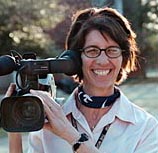When is armed robbery not armed robbery? When a jury in Billings, Montana, cannot convict a half dozen Freemen of their crimes. I went to Brusset, Montana, nearly three years ago, as a camerawoman for ABC News' Prime Time Live. My assignment was to visit a group of antigovernment militants, known as the Freemen, who were accused of threatening to murder a federal judge, and conspiring to commit bank fraud. The Freemen declared their ranch "Justus Township" a sovereignty, and wrote a set of laws based on quaint legal antiquities, and the doctrines of white supremacy. They placed common law liens on the U.S. Government, and issued "funny money" notes based on the value of the liens. They held seminars on their ranch, during which they distributed their bogus checks. An investigative TV producer, from San Diego, later told me that one seminar participant tried to pay for a new Lexus with Freemen notes, and expected to receive his change in cash. Our trip to Brusset took place on October 2, 1995, about five months before the arrests of two Freemen prompted an 81-day standoff at the ranch. When we arrived at the ranch -- that the Freemen had recently stockpiled with food, weapons and ammo -- we met Ralph Clark, one of the Freemen. He said he was the "hired hand," and we interviewed him on tape. Clark, who was wearing a fake sheriff's adge, said he needed us to sign some papers. When field producer Alison Sesnon asked him about these papers, Clark became vague, and seemed confused. He did, however, wave me (the camerawoman), sound tech Hal Bowers, and Alison onto the ranch. We looked for posted "No Trespassing" signs, and, finding none, proceeded onto the ranch. We stopped at a group of three cabins, and shot Alison hailing the Freemen. "Mr. Skurdall?" she asked, "Mr. Clark? Mr. Schweitzer?" but there was only silence. We continued up the road to a ranch house, and turned the minivan around so it would be facing out. This has been my habit for over 20 years of working in TV news -- so ingrained that I do it everywhere, including my friends' driveways, and my own. Almost immediately, two pickup trucks came careening up the road, with men standing on the sideboards. I rolled tape as Alison, Hal and I left the van to stand in the open to meet this ambush team. I wanted them to know that we were the ABC crew that had been phoning them, and that we were not from law enforcement. In a matter of seconds, a man, wearing a sidearm, jumped in front of me and grabbed the camera off my shoulder, as some of the others pointed rifles at me, chambering their rounds. They also stole Hal's sound equipment at gunpoint. My camera, in the hands of a militant named Daniel Peterson, continued to roll, as the wireless microphone worn by Alison picked up sound. "Okay, okay, okay!" she said, as one man, dressed paramilitary style, told us that we would come to their "Supreme Court" if we wanted our gear back. This video footage, plus freeze frames of the defendants, were shown to a jury in U.S. district court in Billings, Montana, in June of this year. The prosecution had chosen to try the federal charge of impeding interstate commerce, rather than the state felony of armed robbery. This turned out to be a concept the jury disdained, or perhaps found difficult to comprehend. Defense attorneys tried to portray Alison Sesnon, Hal Bowers and NBC cameraman David Fox, also robbed by the Freemen, as pushy journalists who trespassed on private property and wouldn't take (i)no for an answer. Under cross examination, Alison repeatedly answered that she was trying to get both sides of the story, and that people often change their minds about being interviewed. I was not asked to testify in Montana. U.S. Attorneys George Z. Toscas and Jim Seykora had access to videotapes in which Petersen is seen displaying my betacam on a shelf, like a trophy, and declaring "I'm the one who stole the camera." I don't know whether the tape was shown to the jury. Maybe the prosecutors thought they had a slam dunk. They had video of the defendants stealing my camera at gunpoint. It's hard to imagine what more it would take to get a conviction. The Montana jury convicted half a dozen Freemen on federal charges of bank fraud and threatening the life of a federal judge. It did not reach agreement on the federal charges of armed robbery, and remained hung, forcing the judge to declare a mistrial on those counts. Bryan Costigan, an investigator with the Montana Department of Justice, emailed me a few days later, replying to my questions about the verdict. He suggested that the jury didn't think TV footage was a product, like potatoes or car parts. He said that the jury felt that we "had it coming" since we were on their property. He said that his team is evaluating whether to retry the federal case or to pursue the state charges. Why did they fail to convict? Was it because they thought the ranchers had a right to steal from "the media"? One court watcher was quoted in the Billings Gazette as labeling the jury's decision "the Princess Di factor." He felt that if the Freemen had robbed a local guy from the feed store, the jury would have convicted. I was on their property. We obtained permission, on camera, to enter. I was on assignment, hoping to get some footage of the Freemen. They robbed me at gunpoint, and got away
with their crime.
 Amy Bowers
|
